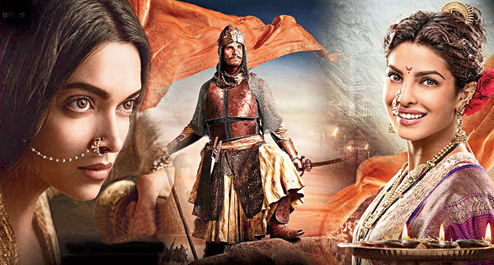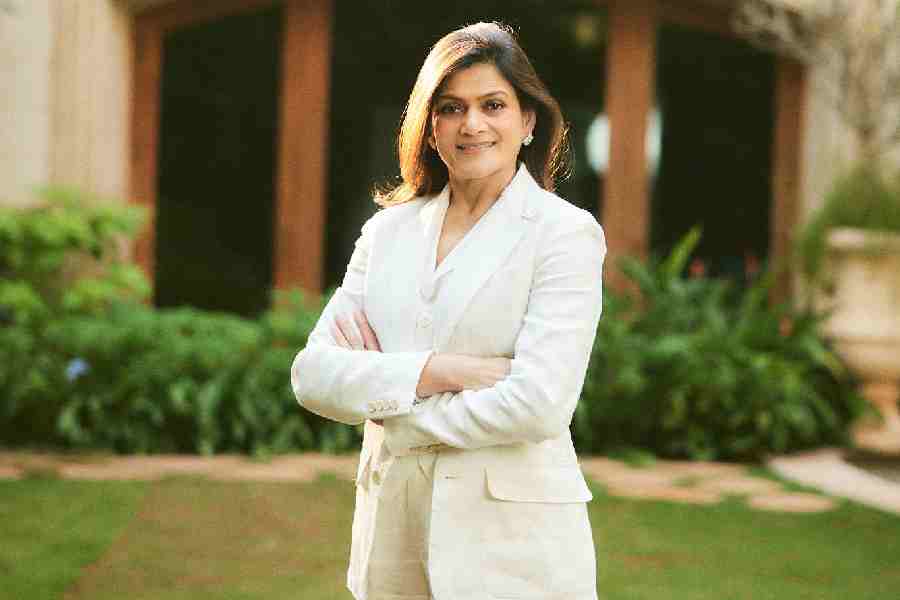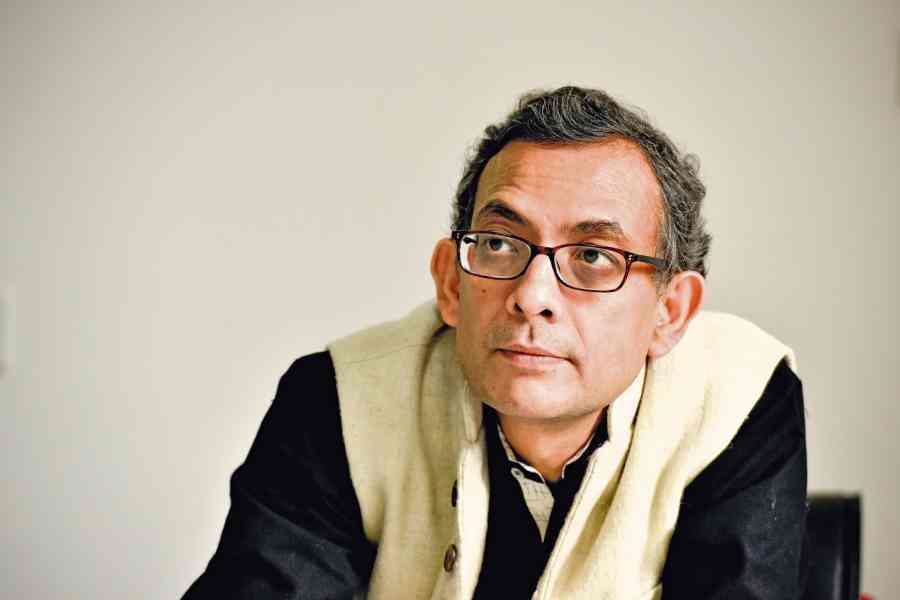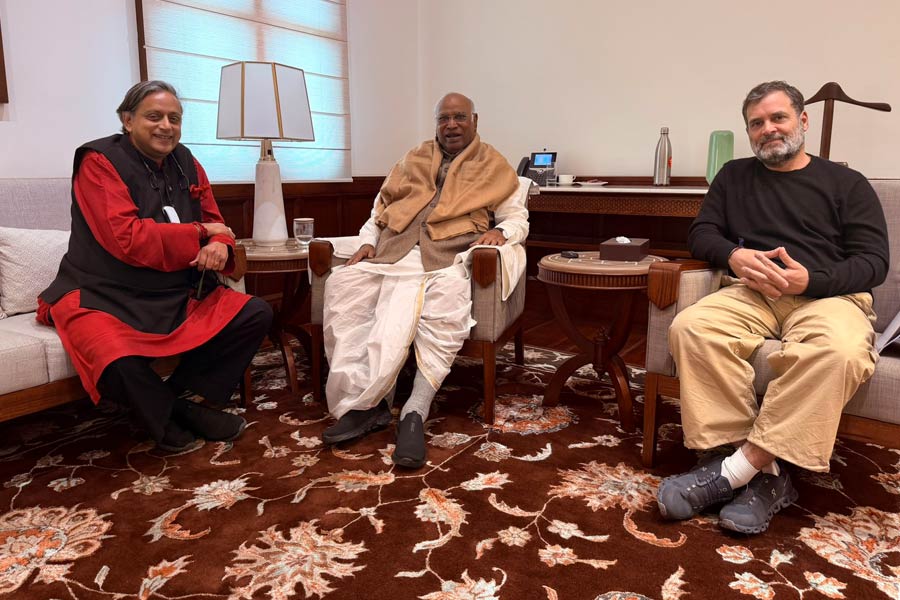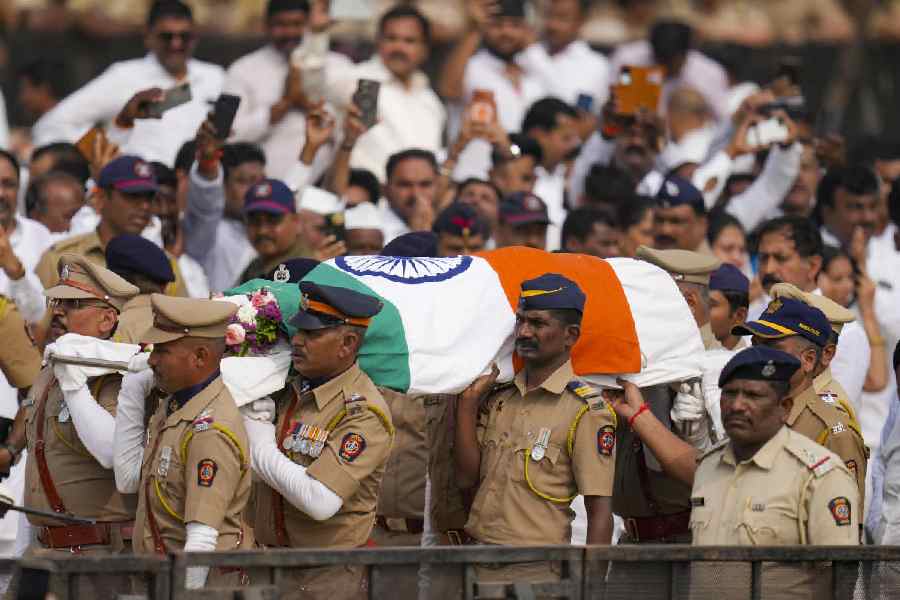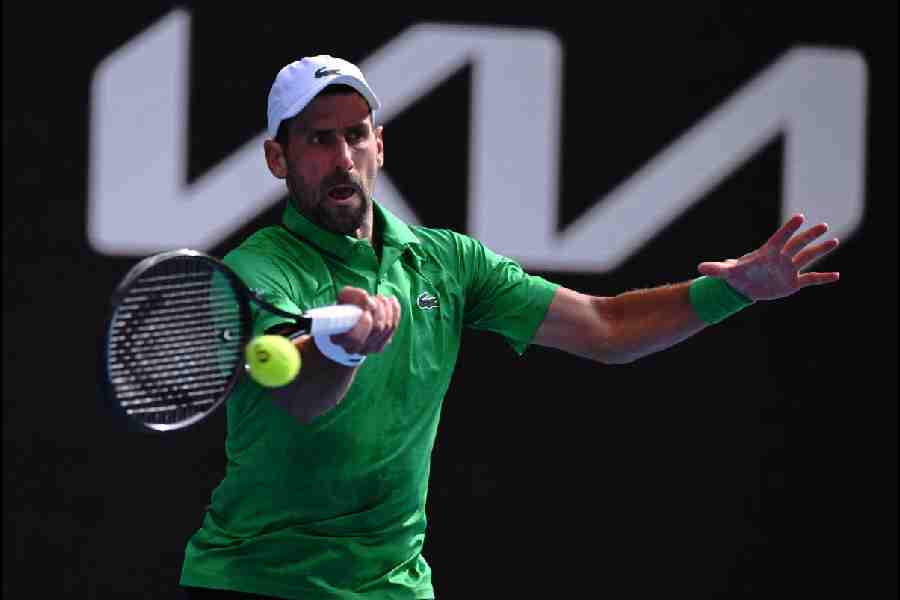BHANSALI OVERWHELMS, DP & PC SHINE, BUT BAJIRAO MASTANI BELONGS TO RANVEER

BAJIRAO MASTANI (U)
Director: Sanjay Leela Bhansali
Cast: Ranveer Singh, Deepika Padukone, Priyanka Chopra, Tanvi Azmi, Milind Soman
Running time: 158 minutes
Har dharm mohabbat sikhata hai. Lekin mohabbat koi dharm nahin sikhati. Kyunki mohabbat hi ek dharm hai....
Bajirao Mastani is the most powerful love story Hindi cinema has produced in recent times. A love story that towers over religion and rules, pride and prejudice. A love story that is as poignant as it is passionate. A love story that blossoms in the face of opposition and reaches its pinnacle when faced with death. A love story that says: “Hamare dil ek saath dhadakte hain… aur ek saath rukte bhi hain”. The love story of Bajirao and Mastani.
Sanjay Leela Bhansali dramatises the romance between 18th century Maratha warrior Peshwa Bajirao I — Brahmin by birth, Kshatriya in war — and his ‘second wife’ Mastani, of mixed Hindu-Muslim parentage, and gives us an overwhelming love story that moves and mesmerises in equal measure. For Bajirao (Ranveer Singh) may have gone down in history as an unvanquished warrior who won 40 battles on the trot, but it is his lesser-documented personal life — particularly his unflinching love for Mastani (Deepika Padukone) — that is the point of intrigue.
In doing so, Bhansali — who has lived and breathed Bajirao Mastani over a dozen years — takes a host of cinematic liberties, both on the battlefield and in the bedroom. But the filmmaker, who has had to contend with criticism over the historical accuracy of his work in the run-up to release, makes it clear at the beginning that his film “does not warrant, represent or claim to be historically accurate”.
And to be honest, it needed a man of the imagination of Bhansali to bring alive the story of Bajirao and Mastani. From the moment she boldly strides into his tent, sword in hand and with resolve of steel to ask for his help in saving her native Bundlekhand from invaders, Bajirao finds himself inexorably drawn to Mastani. They take on their adversary together, each watching the others’ back, and before long, he’s stolen into her private chamber and they have become lovers for life.
Despite his growing attraction, Bajirao finds himself leaving her and heading back to Pune, right into the arms of his first wife Kashibai (Priyanka Chopra). But the fiery and feisty Mastani is not one to let go of her man so easily and she follows him right back, content to lead the rest of her life as his ‘second wife’. But that’s not something that comes to her on a platter: Mastani’s religion — that she is half-Rajput too is of no consequence here — is a huge hurdle in her love story with Bajirao and she constantly finds herself being derided and humiliated — from being banished to the fringes of the town to being reduced to a court dancer.
But this is a love story that knows not to give up, and it continues to defy all odds — sometimes through whispered promises behind closed doors, often with public proclamations of love. “Kiski talwaar pe sar rakhoon yeh bataa do mujhe… ishq karna agar khataa hai toh sazaa do mujhe,” is their common cry to the heartless world.
But this is a Bhansali film and every action and emotion is made epic and exquisite. Right from the first frame, the filmmaker unleashes one eyeball-grabbing set piece after another. From Bajirao’s introductory scene — where he proves his ability to be crowned Peshwa with his prowess with the bow and arrow — to a stunning Mastani, swathed in gold, moving seductively to the beats of Deewani mastani, even as her image is reflected in thousands of mirrors that surround her (yes, very Mughal-e-Azam), Bhansali shows that when it comes to telling stories with flamboyance, there is no one who can do it better than him.
The extravagant backdrop is backed by an operatic narrative, melodramatic dialogue and jaw-dropping song ’n’ dance sequences. The war scenes are carefully choreographed and mounted on a canvas where every frame has a sense of urgency and every action envelopes the viewer. Bhansali isn’t a man to rely too much on VFX and even when he resorts to it — like Bajirao felling an enemy by skilfully mounting the elephant on which he is sitting or stopping an arrow with his bare hand — he makes sure it blends in well with the fabric of his film. He has an able ally in Sudeep Chatterjee whose powerful lens imaginatively captures every mood and moment — from Mastani’s ethereal beauty to Bajirao’s steely eyes, from the thousands of saffron flags billowing in the wind to the shot of Bajirao’s lifeless body sinking into the sea as bolts of lightning hit the waves.
There is no faulting Bhansali’s eye for the gorgeous, but there is more of Bhansali the storyteller that needed to come forth in Bajirao Mastani. Bajirao’s exploits and some of his relationships — with comrade and kin — are glossed over. Bhansali, possibly fearful of a backlash, doesn’t delve much into the religious politics of the time, save for passing mentions of the ever-present conflict between ‘kesariya’ and ‘hara’. And sometimes — and sometimes more than that — Bhansali’s sparkle takes away the soul of Bhansali’s story.
The shimmering sets and shiny costumes are, however, not what make Bajirao Mastani. The brightest spark comes from his lead actors, each of whom excels. True to form, Deepika Padukone shines — first as a spirited warrior princess and then as a woman defiant in love. It’s to her credit that she brings alive a character that remains the most under-written of the three main leads, with every frame she inhabits — from fighting her way through an army alone to the way she manages to smile so powerfully through her tears — contributing to the story. Priyanka Chopra has too little screen-time, but her Kashibai is a better developed character — playful wife to scorned woman to a mature mother — and Priyanka says it all through her eyes. The two women share many a frame, but it is their energetic moves and ever-changing equations in Pinga — though not a patch on Devdas’s Dola re — that shows us why DP and PC are counted among Bolly’s most powerful performers. Tanvi Azmi — as Bajirao’s mother Radhabai — is the pick of the supporting acts.
But in the end, Bajirao Mastani belongs to Ranveer Singh. The man — known for his OTT energy levels — brings a certain restraint to his role that few of his contemporaries could have. Ranveer brings alive the dilemma of Bajirao the husband, the madness of Bajirao the lover and the helplessness of Bajirao the leader to give us a man who kills without emotion, but loves with all passion. A love that defines him in life and elevates him in death. A man who believed that ishq ibaadat hai, aur ibaadat ishq.
IF ONLY RAJ AND SIMRAN WOULD BE ALLOWED TO RIP — ROMANCE IN PEACE!

DILWALE (U/A)
Director: Rohit Shetty
Cast: Shah Rukh Khan, Kajol, Varun Dhawan, Kriti Sanon, Boman Irani, Johny Lever, Varun Sharma
Running time: 155 minutes
They don’t need flying cars for momentum. They don’t need a young pair for support. They don’t need comic set pieces for relief. They don’t need Iceland and Bulgaria. They don’t need 360 degree cameras. And they certainly don’t need Rohit Shetty.
You don’t mess with Shah Rukh Khan and Kajol. Even if Shah Rukh Khan is paying for the mess. Even if Shah Rukh Khan will make money out of the mess.
Dilwale is a frustrating watch, just for the feeling of being in a SRK-Kajol film where everything else keeps snatching away the spotlight — and screen time.
There’s the love story of Varun Dhawan, who seems to be modelling for Gold’s Gym and Farex at the same time, and Kriti Sanon, who keeps walking in every song and scene like the film is a marathon.
Then there’s yet another love story featuring yet another Varun — Varun Sharma (Fukrey). Now add parallel comedy tracks featuring Johny Lever as Money Bhai, Boman Irani as King and Sanjai Mishra as Oscar. As their names suggest, it’s farce incarnate.
As for the plot, it’s yet another rehash of an Amitabh Bachchan film for SRK after Don. This time the source is Mukul Anand’s Hum, where a gunda leaves behind his life of crime to bring up his stepbrother in a clean environment and how the past returns to haunt him. Bachchan’s Tiger there is Shah Rukh’s Kaali (Joy Maa!) here, the man with the golden gun in Bulgaria 15 years ago.
Kajol is the Kimi Katkar of the piece with such a forced twist that her character has to change heart in every scene for the story to move ahead. Anyway they blow up so many cars in the flashback that Kaali becomes a “car modifier” (new Bolly term for mechanic who works on imported cars) in Rohit’s rainbow-framed backyard in Goa.
And you thought Raj and Simran would be allowed to RIP — Romance In Peace. Only in a couple of scenes and a couple of songs. And the tragedy is they are still pure gold. The look into each other’s eyes, her running towards him and holding him from behind, him breathing all passion down her neck... Iss se zyaada pyaar aur koi nahin kar sakta....
Isn’t Gerua just a reprisal of Suraj hua maddham in a different setting punctuated with memories of Tujhe dekha toh yeh jaana sanam and Kuch kuch hota hai? Doesn’t time stand still when Shah Rukh Khan and Kajol swing into a frame? Doesn’t it stir up your own love stories, don’t they reinstil the ‘R’ in romance?
Dilwale is where “a SRK-Kajol film” battles “a Rohit Shetty film” and comes out second. How much you care for the film will depend on which film you’ve gone in to watch. The title’s a cheat, though. If the original ‘Dilwale’ hadn’t got his ‘Dulhania’ that day at Apta Station, he wouldn’t have wasted so many years to win back his lady love.
In the scene where the two realise that they were part of such a plot and they just lost 15 years because they couldn’t check facts for 15 seconds, SRK tells Kajol the one line of the movie which, ironically, makes sense: “Kasoor tumhara nahin, kasoor mera nahin, kasoor haalaat ka hai.”
Yes, we are at this precarious point in Indian cinema where one of the greatest screen couples of all time has to feed on the crumbs left over from an all-you-can’t-eat Rohit Shetty buffet. You go help yourself to a serving of Gerua, a spoon of Janam janam and that eternal DDLJ line thrown in the last shot for dessert. Some love stories don’t die, even if they are sideshows in a car porn film.
Pratim D. Gupta
I loved/ hated Dilwale because....
Tell t2@abp.in
Priyanka Roy
Bajirao Mastani is the love story of the year because....
Tell t2@abp.in

